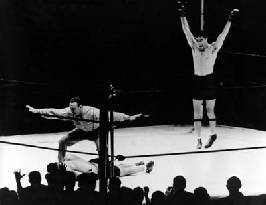Max Schmeling, boxing champion and reluctant Nazi symbol, died on February 2nd, aged 99
MEMORY is unkind to many, but to Max Schmeling more than most. The athletic skills of Germany’s only ever world heavyweight boxing champion were matched by his lifelong generosity. But outside Germany, he is remembered mainly as a symbol of Nazism for his two fights with an American boxer, Joe Louis. The first, which he won in 1936, warmed the cold heart of Hitler, who found him a perfect propaganda tool, an Aryan superman. In the second fight, Louis flattened Schmeling in just over two minutes, and the former world champion fell in the Nazis’ esteem as quickly as he had risen. Later he would give thanks for losing that fight.
Maximilian Siegfried Adolph Otto Schmeling was born in Klein-Lucknow, in Upper Pomerania, in 1905, to a farmer’s daughter and a helmsman for the Hamburg-America sailing line. The quiet child joined a boxing club at 18, and won his first fight (and 80 reichsmarks) in 1924. He moved quickly through the ranks and weight classes, and in 1930 he became world heavyweight champion, beating Jack Sharkey by disqualification. He lost the title to Sharkey in 1932.
His greatest victory came against Louis. The much younger American was undefeated and a heavy favourite. But Schmeling found gaps in his defences, knocking him out in the 12th round. Hitler was ecstatic, and invited Schmeling for coffee and crumbcake. But the fighter would not be a Nazi hero, turning down an honorary title of Sturmführer. He refused to fire his Jewish-American manager or divorce his Czech wife. In 1938, during the Kristallnacht pogroms across Germany, Schmeling hid two teenage sons of a Jewish friend in his hotel room for several days.
Schmeling’s defeat in the second bout with Louis saw him fall in Hitler’s estimation. His subsequent drafting into the Wehrmacht may have been a punishment. He was a paratrooper, and was injured badly on landing in a daring airborne attack on Crete. He left the army and began boxing again. During an exhibition fight in occupied Paris in 1944, he declined to give the Nazi salute when introduced, raising both fists instead.
A few more fights after the war earned him enough money first to start a farm and then to buy a Coca-Cola distributorship. He became wealthy again, and used his money to become one of Germany’s biggest philanthropists. His only child, a son, had died at seven months old, and children were frequent beneficiaries of his generosity. As was Joe Louis. The men became lifelong friends, and Schmeling often gave the down-and-out American money. He paid for Louis’s funeral in 1981.
In Germany Schmeling was a hero, but in the country where he won his greatest victory, he was remembered mainly as that Nazi. The two children he saved during Kristallnacht did not forget. Henri Lewin, who later became a wealthy hotelier in California, said ”If this is a Nazi, he’s a good Nazi, but I want you to know one thing—I wouldn’t be sitting here today if it wasn’t for this Nazi.” Well into his 90s, Schmeling loved to travel and talk boxing, but he declined to be recognised publicly by the Raoul Wallenberg Foundation for saving the Lewins’ lives. He was sent a certificate and a medal instead.

